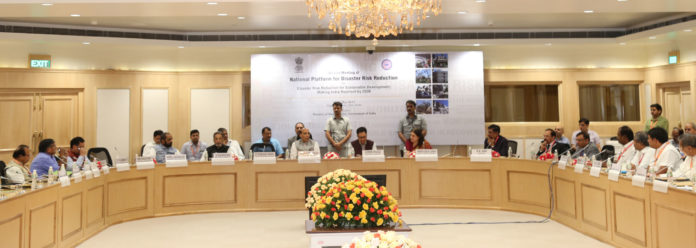
Shri Rajnath Singh inaugurates second meeting of National Platform on Disaster Risk Reduction
Theme of the meeting is “Disaster Risk Reduction for Sustainable Development: Making India resilient by 2030”
The Union Home Minister Shri Rajnath Singh inaugurated the two-day second meeting of National Platform for Disaster Risk Reduction (NPDRR) here today. The theme of the Second meeting of NPDRR is “Disaster Risk Reduction for Sustainable Development: Making India resilient by 2030”. The Union Minister for Science & Technology and Earth Sciences, Dr. Harsh Vardhan, the Minister of State for Home Affairs, Shri Kiren Rijiju and Additional Principal Secretary to Prime Minister Dr. P. K. Mishra were also present on the occasion. The NPDRR is a multi-stakeholders National Platform headed by the Union Home Minister and it promotes participatory decision making in disaster management, and strengthens federal policy of our country.
Speaking on the occasion, Shri Rajnath Singh said that NPDRR is a multi-stakeholders National Platform for sharing the experiences in disaster management and for making a collective effort for disaster risk reduction. He emphasized the role of prevention and mitigation in reducing disaster losses. He pointed out that 1 extra Rupee spent on disaster preparedness and mitigation could save 10 Rupees of disaster loss.
He recollected global agreements like Sendai Framework, Sustainable Development Goal and Paris Agreement on Climate Change (COP21) for disaster risk reduction. He highlighted the ongoing efforts of Governments in disaster risk reduction like preparation of disaster management plan and policy, development of early warning systems, construction of cyclone shelters and saline embankments, raising of disaster response forces at national and state levels and capacity building of communities through continuous training and awareness programme.
Shri Rajnath Singh also shared the recent initiatives of Government of India for increasing the regional co-operation, like launching of dedicated satellite for South Asian Countries, Asian Ministerial Conference on Disaster Risk Reduction (AMCDRR) 2016 and setting up of SAARC disaster management centre. He appealed to the stakeholders to prevent “preventable death” caused by disasters and also prepare an action plan for vulnerable communities of societies. As sustainable developments are closely related with better disaster management, he urged all stakeholders to make all development initiatives disaster resilient. He informed that 14 pre-events were organized as build up to this meeting.
Shri Kiren Rijiju, Union Minister of State for Home Affairs, informed that India is a disaster prone country and stressed the need to continuously enhance our preparedness and risk reduction measures. He referred to 10 point-agenda for disaster risk reduction given by our Prime Minister during AMCDRR 2016 and urged the participants to draw concrete plans to implement this agenda into reality. He requested the disaster managers to give proper consideration to geo-physical condition of the particular State/UTs, while making any action plan for disaster risk reduction.
Shri R. K. Jain, Member, National Disaster Management Authority in his welcome address highlighted the achievements of Government of India in disaster risk reduction. A film emphasizing the theme that Disaster Management is Everybody’s Business was screened. Further, version 3.0 of National Database on Emergency Management (NDEM) was launched by Shri Rajnath Singh. This version of 3.0 is device independent and browser independent and equipped with latest resource mapping tools and audio and video conference facilities.
The Union Home Minister also chaired a Ministerial Session which was attended by the Union Minister of Women and Child Development Smt Maneka Sanjay Gandhi, Union Minister of Agriculture and Farmers Welfare Shri Radha Mohan Singh, Ministers of State for Home Affairs, Shri Hansraj Gangaram Ahir & Shri Kiren Rijiju and Ministers from states of Haryana, Jharkhand, Maharashtra, Rajasthan, Tamil Nadu and Uttar Pradesh. Prof Jagdish Mukhi, LG of Andaman and Nicobar Islands also participated. Shri Rajnath Singh informed that growing population, unplanned urbanization and climate change are the new challenges posing new disaster risks to the country.
He emphasized the primary role of States and Union Territories in disaster management and urged them to equip themselves for facing these new disaster risks. He lauded the initiatives and preparedness of States. He appealed to all the State/UTs to continuously upgrade their preparedness and plan for making the country disaster resilient. While stressing the need for political commitment, he emphasized the need for bilateral and regional cooperation among the States, Union Territories and Central Government.
Ministers from Union and States highlighted their initiatives in disaster risk reduction and endorsed their commitment to make the country disaster resilient by 2030 in line with the Prime Minister’s 10 point Agenda.
Besides opening and Ministerial sessions, this NPDRR meeting will have one Plenary Session, one session on outcomes of pre-events, four technical sessions on four priority areas of Sendai Framework for Disaster Risk Reduction, one technical session on monitoring of Sendai Framework and a closing cum valedictory session. Along the meeting, innovative ideas by start-ups in disaster management and best practices in disaster management by the States are displayed in the exhibition area.
The meeting is being attended by over 1000 distinguished guests including State Ministers, Parliamentarians, Heads of Local Self Government, Heads of specialized disaster management agencies, academicians, representatives from private sector organizations, media and civil society organizations.



















